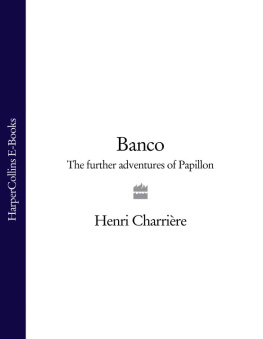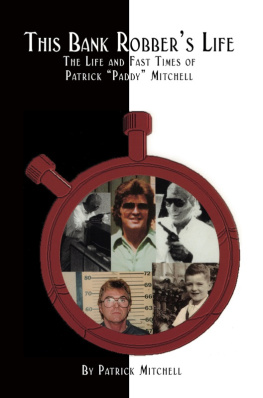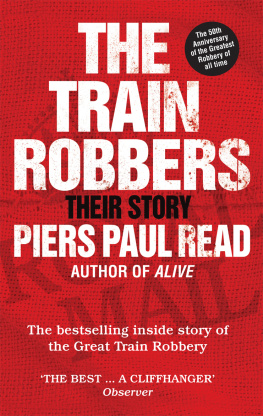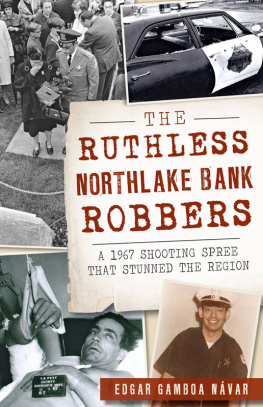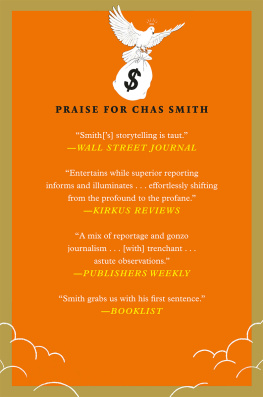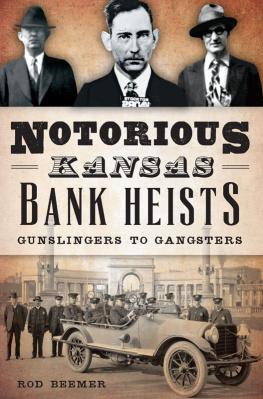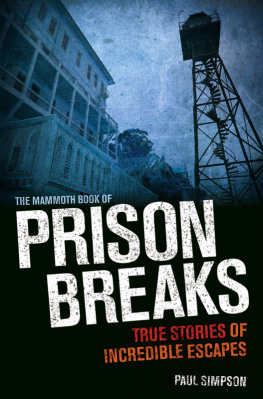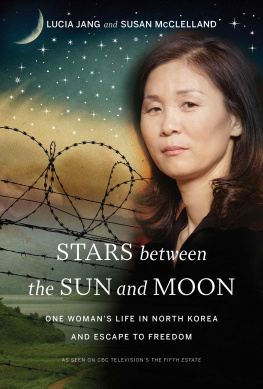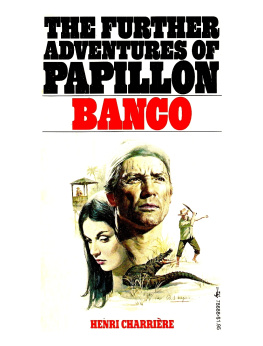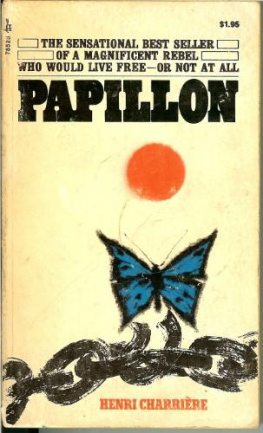To the memory of Dr Alex Guibert-Germain, to Madame Alex Guibert-Germain, to my countrymen, the Venezuelans, to my French, Spanish, Swiss, Belgian, Italian, Yugoslav, German, English, Greek, American, Turkish, Finnish, Japanese, Israeli, Swedish, Czechoslovak, Danish, Argentine, Colombian, and Brazilian friends and all those friends who are faceless but who have done me the honour of writing to me.
What you think of yourself matters more than what others think of you.
(author unknown to Papillon)
MIDDLE-AGED, impoverished by an earthquake and worried about his future, Henri Charrire sat down to write a book to restore his fortunes: it was his first, and he called it Papillon, the name by which he had been known in the underworld of Paris and in the French penal settlements. He had no great opinion of himself as an author and he was quite willing to have it improved, cut about and put into good French; but the first publisher he sent it to happened to employ a brilliant editor who at once realized the exceptional quality of the manuscript and who delivered it to an astonished public in its original state, merely tidying up the punctuation, the spelling and a very few points of style.
That was in 1970, the year of the phnomne Papillon, a phenomenon almost unparalleled in the annals of publishing: it was not only that an extraordinary number of people read the book (850,000 copies were sold in the first few months), but that the readers embraced the whole spectrum of literary opinion, from the Acadmie Franaise to those whose lips moved slowly as they made their fascinated way through the strange adventures of an indomitable man struggling against the society that had sent him to rot in the infamous tropical prisons of Guiana with a life-sentence for a murder that he had never committed.
They were all deeply moved by the burning sense of injustice that runs right through the book and that gives it its coherence and validity, but even more by Papillons sheer narrative power, his innate genius for telling a story. This is a literary prodigy, said Franois Mauriac. It is utterly fascinating readingThis new colleague of ours is a master! And he pointed out that it was not enough to have been a transported convict and to have escaped again and again; extraordinary talent was required to give the book its ring of truth and to make its value exactly proportional to its immense success.
The soundness of Mauriacs words can be seen not only from the immense quantities of hopeless manuscripts by other ex-prisoners (purple characters, but untouched by genius) that flow into publishers offices every week, but also by the baldness of the following summary that is intended to put the reader of this second volume into the picture: the main facts are here, but I am the first to admit that the heart of the matter is lacking.
The facts, then: in 1931 Henri Charrire, alias Papillon, was sentenced to transportation for life and he was taken away with some hundreds of others in a prison-ship bound for South America, for French Guiana. Here he found himself in an appallingly tough and savage world where corruption, terrorism, sodomy and murder were commonplace; he was well equipped for survival in this world, being as tough as any man there, perfectly loyal to his friends and perfectly uncompromising in his hatred of the official establishment, and in time he could have carved out a respectable place for himself. But he had no intention of staying; he had sworn not to serve his unjust sentence, and forty-two days after his arrival he made a break. With two companions (one broke his leg in escaping) he made his way down the Maroni river in a crazy boat; at a remote lepers island they changed boats and so rode out to sea, sailing under the broiling sun day after day until at last they reached Trinidad. On and on to Curaao, where the boat was wrecked; on to Rio Hacha in Colombia, where the wind failed them and they were taken prisoner. Another break, this time with a Colombian friend, and eventually Papillon reached hostile Indian territory, alone and on foot. They took him in, gave him two wives, and then, when at last he would stay no longer, a bag of pearls. Back to Colombia, only to be arrested and imprisoned once more, and, after several abortive breaks, handed over to the French authorities. Then solitary confinement on the le Saint-Josepha deeply moving account of the silence, the heat and the utter loneliness of that dim, timeless, underground cagetwo years of it. When at last it was over and he was out in the light again, he began to make a raft for another break; but a fellow convict informed upon him, and having killed the informer he went back to solitaryan eight years sentence cut to nineteen months for rescuing a little girl from the sharks. Another attempt to escape; transfer to Devils Island and then the final break at last, riding two sacks of coconuts through the shark-infested sea to the mainland. A new boat and a new series of adventures brought him, by way of British Guiana (and a new wife), to Venezuela and to the Venezuelan penal settlement at El Dorado, where he was held on the charge of being a rogue and a vagabond. But a coup dtat in Caracas brought the promise of release, and the last pages of the book show Papillon, equipped with genuine papers at last, and dressed in good civilian clothes, ready to walk out into freedom after thirteen years of being in prison or on the run. That is where the present volume starts, and from now on his story is told in his own infinitely more living words.
But, before I leave Henri Charrire to tell his own story, perhaps I may be permitted to say a word about the translation. I had followed Papillons wild success; I had watched the splendid time the author was having (Papillon in a sledge with Brigitte Bardot, Papillon with an immense cigar and a diamond ring, Papillon in a dinner-jacket, painting Paris red) with delight and with admiration for his iron resistance; but I had been afraid that fame and wealth might alter his style and complicate my task. Not at all: as soon as I looked into Banco I recognized exactly the same voice: here and there a slightly more literary turn of phrase, here and there a literary allusion, but not the least change in the essential Papillon. So I made no alteration in the techniques I had adopted for translating his earlier book: of these the only one that seems to call for any explanation is my use of a somewhat archaic Americanized slang, particularly in the dialogue. This seemed to me the only way of rendering Papillons equally archaic argot; and in the few cases where even American would not quite yield the liveliness of the French, I comforted myself with the proverb from Papillons own country: If you cannot have thrushes to eat, then you must make do with blackbirds.
PATRICK OBRIAN
GOOD luck, Frenchman! From this moment, youre free. Adios!
The officer of the El Dorado penal settlement waved and turned his back.
And it was no harder than that to get rid of the chains I had been dragging behind me these thirteen years. I held Picolino by the arm and we took a few steps up the steep path from the river-bank, where the officer had left us, to the village of El Dorado. And now, sitting here in my old Spanish house on the night of 18th August 1971, to be exact, I can see myself with unbelievable clarity on that pebbly track; and not only does the officers voice ring in my ears in just the same way, deep and clear, but I make the same movement that I made twenty-seven years ago I turn my head.
It is midnight: outsid, the night is dark. And yet its not. For me, for me alone, the sun is shining: its ten oclock in the morning and I stare at the loveliest shoulders, the loveliest back I have ever seen in my life my gaolers back moving farther and farther away, symbolizing the end of the watching, the spying, the surveillance that had gone on every day, night, minute and second, never stopping for thirteen years.

